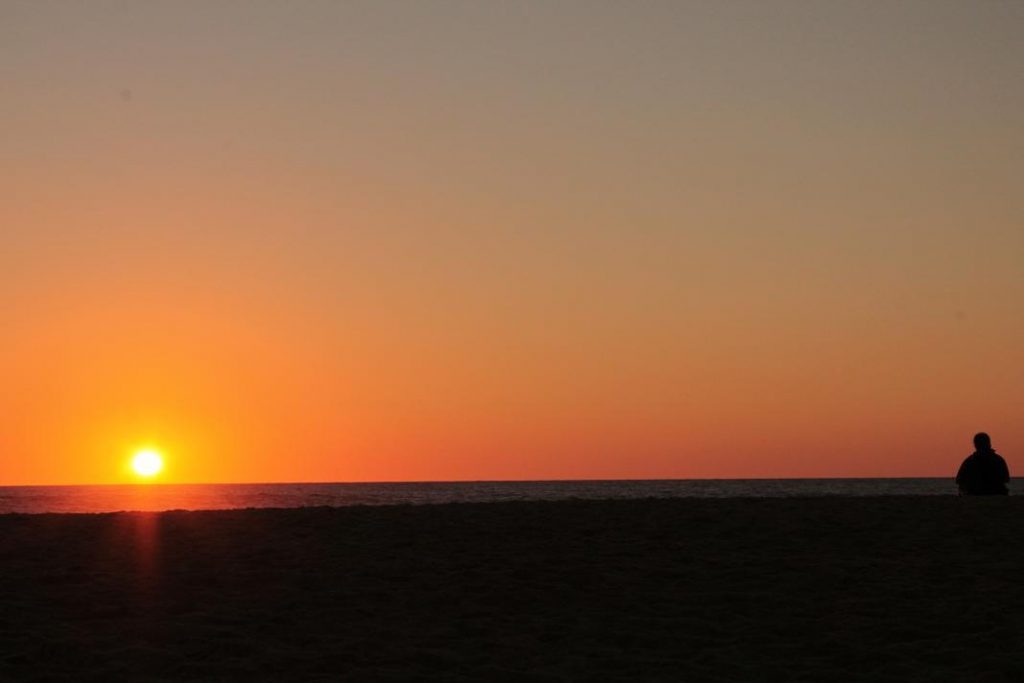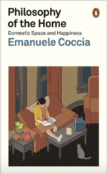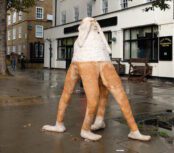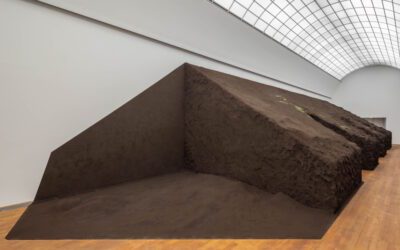[dropcap style=”font-size:100px; color:#992211;”]O[/dropcap]ne difference between this article and the previous ones is that this one will be much more personal.
Whereas in the previous articles I was still trying to understand what the experience of living with ALS would be like, now I am living that. Some of the things I’ve talked about in the previous two articles came from a more philosophical or theoretical basis, whereas now I am pretty much confronted with the situation as reality. So I find myself less drawn to reading what others have said about their experiences with ALS, not because I am unsympathetic or no longer interested, but because for myself this topic is no longer abstract and speculative. It is very real and concrete.
[quote]I’m fairly profoundly disabled.
I can no longer walk.
I only have partial use of one arm.
My speech, breathing, and
swallowing are very difficult[/quote]
My original impulse for doing these articles was to share with my daughter some of what I’m going through. She just turned six, is too young to really understand it now, and by the time she is old enough I’ll be gone. Writing seemed a good way to help her know a bit about who her dad was. Beyond that, my wife thought that maybe other people might also benefit in terms of understanding more about ALS and people living with it, so she suggested that I might put these articles out in public. Since I had already published some music and sound related articles with Trebuchet, I approached them with the idea of also publishing these pieces and they enthusiastically agreed.
It seemed to me that maybe updating where I am now, both physically and psychologically/emotionally, might be helpful. I wanted to bring things up to date because when I wrote the last article late last year I was still physically pretty capable; I think I had only recently begun walking with a cane. Other than problems with my right arm and a little bit of trouble with my right leg, I was doing just fine. However, by now my physical situation is drastically changed. The obvious consequence of this process is a very different way of living. I don’t quite want to say I have a significantly different quality of life, although I suppose that would be the honest way to phrase it. At any rate, that is my situation.
At this point, physically, I’m fairly profoundly disabled. I can no longer walk. I only have partial use of one arm. My speech, breathing, and swallowing are very difficult. What this means is that I’m more dependent on others for my basic necessities than I have ever been since I was an infant. As someone who has been fairly independent and protective of my own kind of quiet and alone time, my life experience has very much changed. Beyond the obvious reality of no longer being able to do many of the activities that I love, like music making, hiking and fishing, etc., I have virtually no privacy whatsoever. I think this has been the hardest thing to adjust to.
I try to maintain a positive outlook – and I do still enjoy the beauty of the world around me – but it is hard not to get frustrated and discouraged when I can’t even feed myself or go to the toilet unassisted. In a previous article I referenced the idea that ALS is kind of like a prison sentence within your own body. I am beginning to see just how true that is. Now that even using the computer is so challenging that it’s hard to interact online with others out in the world, I find that my world is shrinking. Speech is becoming very difficult so I find myself alternately frustrated and just resigned to not expressing a lot of what I am thinking because it is just too difficult. This shrinks my world even more.
[quote]Listening is often a way of
remembering, so sometimes my
memories and associations are
more compelling than the music
and sound themselves[/quote]
My focus now has become how to preserve quality of life under these very different and diminished circumstances. A recent move back to the US from Singapore has ultimately been very good because we’ve been able to reconnect with and experience a very generous and supportive community of friends. While I get discouraged sometimes, I’m also very appreciative of the beauty and generosity that people are capable of, and that is very encouraging. I find that friends and family are more important now than at any point in my life, not just because I depend on them, but more because that really is where I find value in life.
Being able to share thoughts and memories and experiences has become, I guess, my primary way of experiencing the world. I’m also listening to a lot more music and the sounds around me. Listening is often a way of remembering, so sometimes my memories and associations are more compelling than the music and sound themselves. I’m also aware that soon, listening and watching will become the only things I’ll be able to do; my only ways of participating in the world outside myself.
As someone who has spent so much of their life involved with sound, the irony is not lost on me that pretty soon sound will be the only way I can stay connected to the world outside. I don’t want to make this article too depressing. I need to bring in some more of the positive things, because my life at this point isn’t primarily frustrating or depressing. I deal with those things but there’s still enough beauty and fulfillment in my life that I still enjoy getting up each day, and doing what I can to participate in that.
There are two topics that I would like to explore. One is about how I am trying to deal with this illness and impending death in a proactive manner. I have frequently gotten comments from friends expressing that they find my attitude extraordinary, somehow the implication being that there is something heroic or admirable about it. While I am grateful for those positive words, I don’t feel heroic or extraordinary in any way, because really I am dealing with it the only way I know how. I can’t quite imagine how else I would deal with it other than how I am doing it, which is making the most of what I can do with the time I have left. 
The alternative as I see it just doesn’t make any sense: just resigning myself to being depressed all the time doesn’t seem very attractive. As I said to someone recently, “What else would I do? Just laying in bed and crying all day doesn’t sound very interesting to me.” I can only imagine that most people confronted with a similar situation would do the same, and get what they can out of what life they have left.
So I have been doing my best this past six months or so to try and tie up some loose ends, to come to some sort of completion on some projects that have been very important to me, and to try to realize some of the goals that I have had for my family while I still can. I guess in that regard the major completion that I’m coming to is collecting my body of work as a composer and sound artist for eventual release as a compilation box set of CDs and DVDs. I’ve had some very generous support on this project from both my employer and my friends, and for that I am very grateful. In terms of goals for my family, buying a house that I can leave to my wife and daughter gives me a certain peace of mind that I can still help provide for them after I am gone.
The second idea I’d like to pursue: A friend recently asked me if I had any dreams that I had that I’d like to accomplish with whatever time I have left. I honestly said to her that, with buying this house I have pretty much accomplished most of my dreams. I feel very fortunate that for most of my adult life I have been able to follow my passion and do the things that I find very rewarding and engaging. I’ve not had to worry about a career because I’ve been one of the lucky few able to make a living doing what I love.
The experiences that I have had through music and sound all over the world have been far more than I ever could have wished for growing up. I feel that in that sense I have been very lucky: I have never really had a plan. I have just been able to take advantage of opportunities as they arise – I’ve been able to explore things and be involved with people and projects that have brought a lot of meaning and joy to my life. The fact that in some limited sense they may have also brought joy to others through concerts and recordings has been an unexpected bonus. Similarly, while I found myself early on to be very interested in teaching, I never imagined how fulfilling it would be. To be able to share my passion with people who are just discovering and exploring their own has been amazing and very humbling at the same time. Again, I never really had a plan to make a living as a musician or as a teacher; I just followed my passion and was fortunate enough to find opportunities to make a living doing what I love.
Over the last 20 years I found myself counseling many of my students to – at least at that point in their development – not worry about making a living or having a career. If they connect with their passion and do what they love, the rest of that will take care of itself. My thinking behind that is that if they live a life connected to their passion, they will live a life that they don’t regret. They won’t regret what they did do or what they didn’t do. Sometimes I feel a bit reckless in telling students to forget about the career or job world since I’m very conscious of how lucky I have been to be able to do that myself when I see that so few people around me are able to do so.[quote] if you are pursuing a creative career
because you cannot imagine
doing anything else, then that
is its own reward[/quote]
It seems to me that many people go into careers because they know that they will have a level of financial comfort and then pursue their passions outside their jobs in hobbies and what not. But for me, in that situation I would feel so resentful for having to do things I didn’t want to do that I would become very embittered. So, I feel irresponsible to recommend not worrying about a career to my students because I am aware that this is not how the wider culture usually operates. On the other hand, I’m also aware that particularly in the arts there really are no jobs to prepare my students for: their career is going to be of their own making. If they are not driven by their passion, there is really very little point in having a life in the arts. Lives in the arts for most people are not pathways to wealth and power. If those are the goals that are driving you, you will be very unfulfilled. However, if you are pursuing a creative career because you cannot imagine doing anything else, then that is its own reward. Eventually you will support yourself doing the things you love.
Finally, I guess the thing that has struck me most over the last number of months since my diagnosis has been how afraid our culture is of the topic of death. In reality, it is completely natural – everyone will do it. We treat death as if, if we don’t talk about it it won’t happen – or at least not to us. It seems to me that this alienates us from what can be a rich and meaningful time in people’s lives, particularly for those who are aware of an impending death. Many other cultures have a more holistic view of death, seeing it as part of the whole continuum of life. Which is not to say they don’t feel sadness or a personal loss when someone dies, but rather that sadness and loss are a natural and integral part of what it means to be alive.
I think our culture fetishizes youth and beauty and sequesters the old and infirm away from daily life so that people don’t have to think about death. In my experience, there is still so much richness in life even towards the end, that it seems pointless, if not counter-productive, to cut ourselves off from it. I think that to fully appreciate life, we also need to understand and appreciate death as its natural conclusion.
This is a partially edited transcription of extracts from a conversation between Steven Miller and Tom Fallat July 2, 2014 Santa Fe, NM. Many thanks to Tom for his assistance.
Steven M. Miller is a composer, sound artist, and improviser whose work and interests intersect sound, culture, technology, and the arts. Also an avid photographer, his formal training includes music, audio recording/production, electroacoustics, and interactive media. www.stevenmmiller.net






















